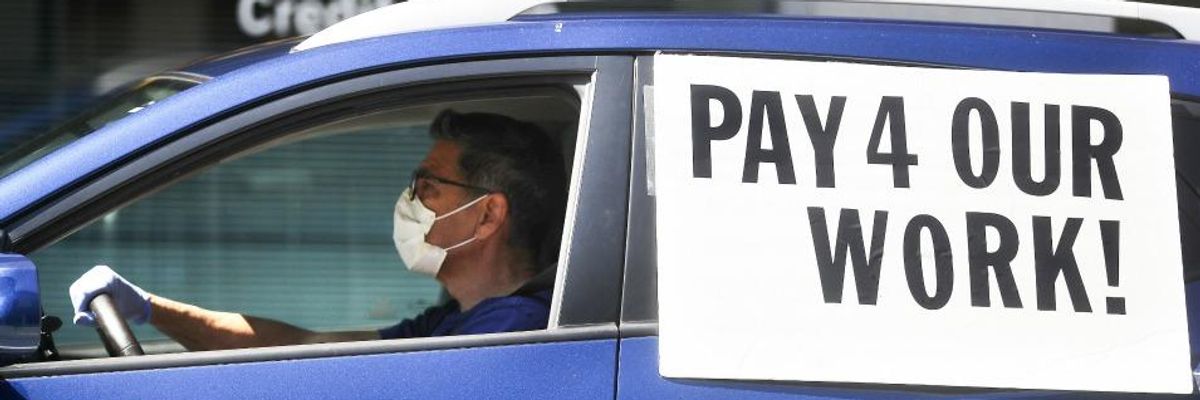A year ago, on May 8, 2019, Uber and other ride-hailing app drivers demonstrated their collective power by launching a worldwide day of action to protest continuous cuts to driver pay. Uber and Lyft drivers in California now plan a follow up day of action next week, on May 11, including a national Facebook live event. And just a week ago, grocery and delivery service workers throughout the U.S. organized strikes and demonstrations on International Workers Day. During national and global lockdowns due to COVID-19, these actions have demanded a collective reckoning over whether these workers are in fact treated as essential or disposable.
Many politicians and corporate executives, safe in their bunkers, have hailed the drivers, grocery and delivery people and warehouse workers for their bravery in showing up to work during a spreading pandemic, calling them essential to our well-being (which they are). Yet they show no qualms about continuing to profit from a business model that seeks to turn every worker into a replaceable gig worker.
Some are heralding the immediate wave of actions as a new dawn for the labor movement. But people working in the gig economy, denied employment status and the benefits it confers, have actually been organizing all along. Perhaps it's just that now their organizing is becoming visible, and winning the broader support from formal labor movements, consumers and communities that it has always deserved.
I've been tracking informal worker organizing around the world for some time, and make no mistake: what we are loosely calling "gig" work have always existed. These workers are variously called freelancers, informal workers, precarious workers, or non-standard workers, and they've always made up the majority of the world's working people. And it's always been nearly impossible for them to exercise collective power.
But now these workers are facing surveillance and unprecedented capital concentration. Platforms like Uber, Doordash and Instacart have, for the first time, amassed a wealth of data and control over an enormous labor pool, not only in the U.S. but around the world. The ways in which work is being fragmented, "optimized," and algorithmically managed is definitely presenting new challenges, even to already precarious workers in low wage countries. When a large share of informal labor comes under the control of a handful of corporations, can it really be called "self-employment?"
Let's go back to May 8 of last year. What started as a California-based labor action spread to Europe, Latin America, Asia and sub-Saharan Africa. To be sure, the numbers of drivers participating in the actions were relatively small. But it was in its own way a "shot heard round the world." The global spread of the message through driver chat groups, Facebook pages and word of mouth highlighted its resonance: gig work is work and no worker is disposable. After the May 8 action, the demonstrations only seemed to gain steam. I kept hearing about protests and actions from Toronto to Nairobi to Dhaka. In France, drivers called a nationwide strike that shut down the company offices nationwide. In India they launched a national federation of drivers.
I spent the year interviewing women and men around the world whose jobs are affected by technology -- the so-called "future of work." My concern, especially in the developing countries where I'd lived and worked for many years, was not that robots would take people's jobs: it was that apps would become their bosses. I'm sharing what I learned through this year of interviews in a new podcast, The Gig.
During this past year I witnessed gig workers self-organize and propel a wave of activity that included lawsuits and legal challenges, successful advocacy for new legislative protections, and ongoing grassroots organizing. And this is what we see today: workers forced to choose between their health and their jobs, and an economy that wants to push them into ever more precarious conditions.
These workers are not suddenly realizing what's happening. They are taking the organizing that they have carefully and painstakingly been building and recognizing that this is the moment to grab attention and make the world notice what they've pointed out all along: they are not self-employed. They work for some of the largest companies in the world, and those companies have been subverting labor markets for years and getting away with it.
It's time to redefine work for the 21st century, and make sure those who profit are responsible to pay and protect workers. We might have imagined that this week's organizing, nearly impossible as it was even under normal circumstances, would be completely derailed by the COVID-19 pandemic. Yet these efforts may prove to have been incredibly important seeds for a future movement.
Some of the organizers behind last year's action are now fighting to ensure that their members, unable to work during the crisis, are able to access the unemployment compensation they need and deserve. Their efforts last year are making it possible to represent these drivers today. And it's thanks to the continuous organizing that there is a public spotlight on governments. California took historic action this week to hold Uber and Lyft accountable for their misclassification of drivers. This would never have happened if not for the wave of activism that has continued through this year and through the pandemic.
And as one of the organizers I interviewed, Yaseen Aslam, recently reminded me, after the crisis is over we won't go back to the way we did things before. The contact-free transactions enabled by apps mean we will see their use grow around the world. The guidelines and protections that he and his fellow organizers win today will have an incredibly important future impact.
I'm sharing what I learned through this year of interviews in The Gig. I encourage you to listen to the stories he and other drivers and organizers have shared with all of us and see if you agree.

